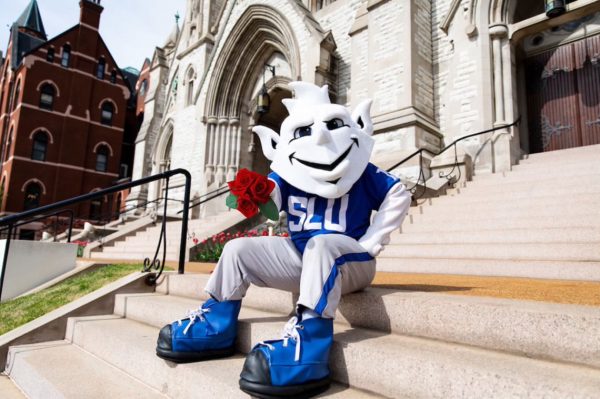Why a Four-Year College Education? Rethinking the Liberal Arts
For many professors it is the time of year when students request letters of recommendation, whether for graduate school, internships or employment, and it might surprise students to learn that, despite adding work to our already busy schedules, writing such letters is one of the most fulfilling and rewarding aspects of a professor’s job. Students might also be shocked to learn that although I am a professor of Theological Studies, most of the letters I write on behalf of SLU undergraduate students are to medical schools or law schools, not for students pursuing further studies in theology and religion. This reality provides occasion for reflecting on the value of a liberal arts education, especially as students register for the coming semester.
According to the Association of Jesuit Colleges and Universities (AJCU), a Jesuit education is grounded in the liberal arts tradition with a focus on quality teaching, critical thinking and rigorous scholarship. St. Ignatius, founder of the Jesuit order, counseled that Jesuit teachers ought to show cura personalis (“personal concern”) for their students, defined as concern for the student’s complete development as human beings—not just their preparation as future employees. Consequently, the humanities remain at the core of a Jesuit education, even as other universities and colleges nationwide make cuts to the liberal arts by eliminating majors in history, political science, economics, English, philosophy and sociology. Still, a quick glance at SLU’s top-enrolled undergraduate majors reveals a decided shift toward STEM and specifically the medical professions: Health Sciences, Nursing, Exercise Science/Physical Science and Biology.
Many academics bemoan the crisis in liberal arts education as enrollment numbers in liberal arts degrees—especially the humanities—continue to decline. With this decline, and as the costs of higher education continue to skyrocket, many colleges and universities unwisely respond by cutting liberal arts majors from their undergraduate curriculum. Unwisely, because statistics paint a very different picture of the merits of a liberal arts degree. According to studies conducted by the Association of American Colleges and Universities (AACU), 4 out of 5 employers want students with a broad knowledge in the liberal arts and sciences while 93 percent of employers value critical thinking, communication skills and the ability to think creatively to solve complex problems. Given employers’ demands for both broad knowledge and specific skills, the positive intangibles of a traditional liberal arts education, intentionally designed to expose students to a breadth of knowledge across the natural sciences, humanities and social sciences, far outweigh any criticism arising from the employment-track thinking that currently permeates higher education.
Admittedly, the cost of a four-year college education drives much of this utilitarian thinking. When Ignatius founded the Collegio Romano in 1551, a sign on the door read: “A school of grammar, humanities, and Christian doctrine. Gratis.” Parents and students do not think “gratis” when they get their tuition bill every year. Yet, despite the high cost of a Jesuit college education, Jesuit colleges and universities have maintained out-of-pocket costs for families relatively constant over the past decade through generous scholarship and financial aid packages. Unfortunately, this generosity has negatively impacted liberal arts programs, as university costs continue to rise while tuition revenue remains constant, or worse, begins to decline and universities are forced to cut costs wherever possible. Though it runs against the grain of the values undergirding Jesuit education, one common solution is to cut under-enrolled programs and majors. At SLU, where most undergraduate students are preparing for careers in the medical field, the humanities and the social sciences have suffered most. Yet things need not be this way.
Perhaps we as faculty have failed our students by not properly advocating for the value of our respective disciplines for your formation as a person and a future professional. Or maybe it is a flaw in undergraduate advising. Whatever the reason, undergraduate students continue to be tracked onto a small handful of majors, while many vibrant, important and valuable majors face cuts or even elimination. I cannot solve the world’s problems in 1200 words, but I can hopefully dispel some misconceptions about higher education and liberal arts majors, at least enough to get students to consider adding a secondary major or minor, or at the very least, encourage students to take courses beyond their narrow pre-professional track and to care more for their development as whole persons.
My good friend, and fellow religion major in college, is now head of the division of Rheumatology-Immunology at the Ohio State University Wexner Medical Center; medical schools recruited her as a humanities major. In fact, a growing number of top medical schools, including University of Pennsylvania, Virginia Tech and University of Michigan intentionally recruit liberal arts majors, with 20-30 percent of their incoming medical school students having majored in either the humanities or social sciences. Undergraduate students (and their parents) also value the pre-law track as a potentially lucrative field. It should come as no surprise that law schools also look for students with a record of academic diversity and a broad base of knowledge. The website for the law school at UC Davis states that “a strong writer with excellent analytical thinking and communication skills makes the ideal law student.”
Finally, foreign languages provide a competitive edge in career choices. The ability to communicate in a second language and to navigate a multicultural world more effectively and responsibly is only possible through sustained language education that aims for linguistic and cultural fluency. Whether a future medical researcher, business entrepreneur, computer programmer, or engineer, SLU undergraduate students are well served by a secondary major or minor in a foreign language, especially from burgeoning global markets. According to economic analysts, Brazil, Russia, India and China will become the world’s dominant suppliers and users of manufactured goods and services by the year 2050. SLU is well-positioned, if it continues to support the Jesuit ideals of a liberal arts education that includes foreign languages, to capitalize on this demographic shift.
Unfortunately, not enough undergraduate students are taking advantage of all the resources available at SLU. For whatever reason, many undergraduate students have convinced themselves that only a small number of majors will lead to their desired vocational goal. In doing so they are short-changing themselves, their future employers and their communities. As stated in the university mission statement, one of the goals of Jesuit higher education is “to work for the good of society as a whole.” Producing well-rounded graduates with a strong sense of civic responsibility who apply their God-given gifts to building the common good begins with a comprehensive education that values all disciplines, from the fine and performing arts to the natural sciences, from mathematics and engineering to the social sciences, and from the humanities to business. While sciences and mathematics majors tend to have higher salaries on average, data shows that over a lifetime humanities and social sciences majors not only close the earning gap, but are also better suited to adapt and succeed as the job market continues to change.
A few years ago, I received a letter from the University of Chicago Law School after having written a letter of recommendation on behalf of a Biology and Theological Studies double major. Because she was so impressed with him, the Associate Dean for Admissions took the time to write me and ask if we had any more students like him. I wrote back and proudly said yes. Sadly, in the last couple of years I have stopped seeing students like that. Students who challenge themselves across multiple disciplines to expand their horizons and cultivate those intangible qualities that make liberal arts majors more successful over a lifetime, as opposed to undergraduate majors who narrowly specialize for job-specific training, are harder to find. It is my hope that students will give more thought to the liberal arts during their educational journey at SLU and take risks by exploring new fields of learning, thereby gaining from SLU everything that makes a Jesuit education distinctive.
Your donation will support the student journalists of Saint Louis University. Your contribution will help us cover our annual website hosting costs.









